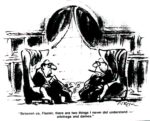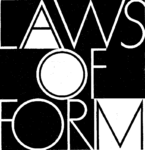In finite probability theory, events are subsets S⊆U of the outcome set. Subsets can be represented by 1-dimensional column vectors. By extending the representation of events to two dimensional matrices, we can introduce “superposition events.”
Extending All Boolean Operations to Partitions
The lattice operations of join and meet were defined for set partitions in the nineteenth century, but no new logical operations on partitions were defined and studied during the twentieth century. Yet there is a simple and natural graph-theoretic method presented here to define any n-ary Boolean operation on partitions. An equivalent closure-theoretic method is […]
Finding the Markets in the Math
This paper shows how to find competitive market prices in the pure mathematics of classical constrained optimization problems.
New Light on the Objective Indefiniteness or Literal Interpretation of QM
This paper shows how the mathematics of QM is the math of indefiniteness and thus, literally and realistically interpreted, it describes an objectively indefinite reality at the quantum level. In particular, the mathematics of wave propagation is shown to also be the math of the evolution of indefinite states that does not change the degree of indistinctness between states. This corrects the historical wrong turn of seeing QM as “wave mechanics” rather than the mechanics of particles with indefinite/definite properties.
A Note on Spencer-Brown’s Algebra
George Spencer-Brown in his cryptic book, Laws of Form, started off reasoning about “the Distinction” and ended up with an algebra that later writers showed to be the Boolean algebra of two elements.
Talk: Hamming distance in classical and quantum logical information theory
This is a set of slides from a talk on introducing the Hamming distance into classical logical information theory and then developing the quantum logical notion of Hamming distance–which turns out to equal a standard notion of distance in quantum information theory, the Hilbert-Schmidt distance.
Talk: New Foundations for Quantum Information Theory
These are the slides for a talk given at the 6th International Conference on New Frontiers in Physics on Crete in August 2017.
Talk: New Foundations for Information Theory
These are the slides for a number of talks on logical information theory as providing new foundations for information theory.
Brain Functors: A mathematical model of intentional perception and action
Semiadjunctions (essentially a formulation of universal mapping properties using hets) can be recombined in a new way to define the notion of a brain functor that provides an abstract model of the intentionality of perception and action (as opposed to the passive reception of sense-data or the reflex generation of behavior).
Logical Information Theory: New Foundations for Information Theory
There is a new theory of information based on logic. The definition of Shannon entropy as well as the notions on joint, conditional, and mutual entropy as defined by Shannon can all be derived by a uniform transformation from the corresponding formulas of logical information theory.





